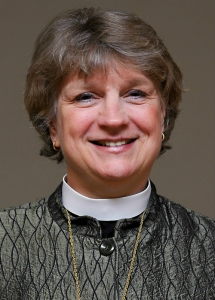 By Bishop Ann Svennungsen
By Bishop Ann Svennungsen
When my father started his optometric practice, he borrowed $2,000 from a local farmer to purchase equipment. When I asked how far $2,000 went in 1952, he said, “Not far. We spent most of it on the phoropter. You know, the instrument for testing vision, the one with all the lenses. After we bought that, we only had enough for second-hand chairs and desk. But we were in the business of helping people see.”
Once a year, we spend a lot of money, time, and energy in hope that we might see things more clearly – so we recognize anew the abundance of God’s provision. We call it Thanksgiving.
THE TRADITION IS AS old as the ancient Israelites. “When you come into the land that the Lord is giving you, take some of the first fruit, set it down before the Lord. Then, with the Levites and foreigners, you shall celebrate all the bounty that God has given you.”
It’s about the gifts. It’s about the Giver. But, something else comes into the focus during this feast. Look again at the table set in Israel. Strangers and foreigners have a place. When we see God as the Giver of everything we have, we recognize anew our place in God’s world. It’s not about me and all I’ve done. If I have resources, talents, wealth – that’s not ultimately my doing. It’s about God and what God has done.
“When we see God as the Giver of everything we have, we recognize anew our place in God’s world.”
And this same God seeks fullness of life for all creation. It’s like my father’s phoropter. Once the right lens is more clearly focused on the goodness of God, the left lens comes into focus as well – revealing the neighbor, especially the neighbor who lacks the fullness of life that God intends.
Walter Brueggemann writes that, in the faith of the scripture, you can’t say “God” without also saying “neighbor.” I hope and pray that as I gather with loved ones this Thursday, I will see just a bit more clearly that all I have is a gift from God and see more vividly the Christ who dwells in the stranger, the oppressed, the forgotten – my beloved neighbor. I pray the same for you.
Happy Thanksgiving!

